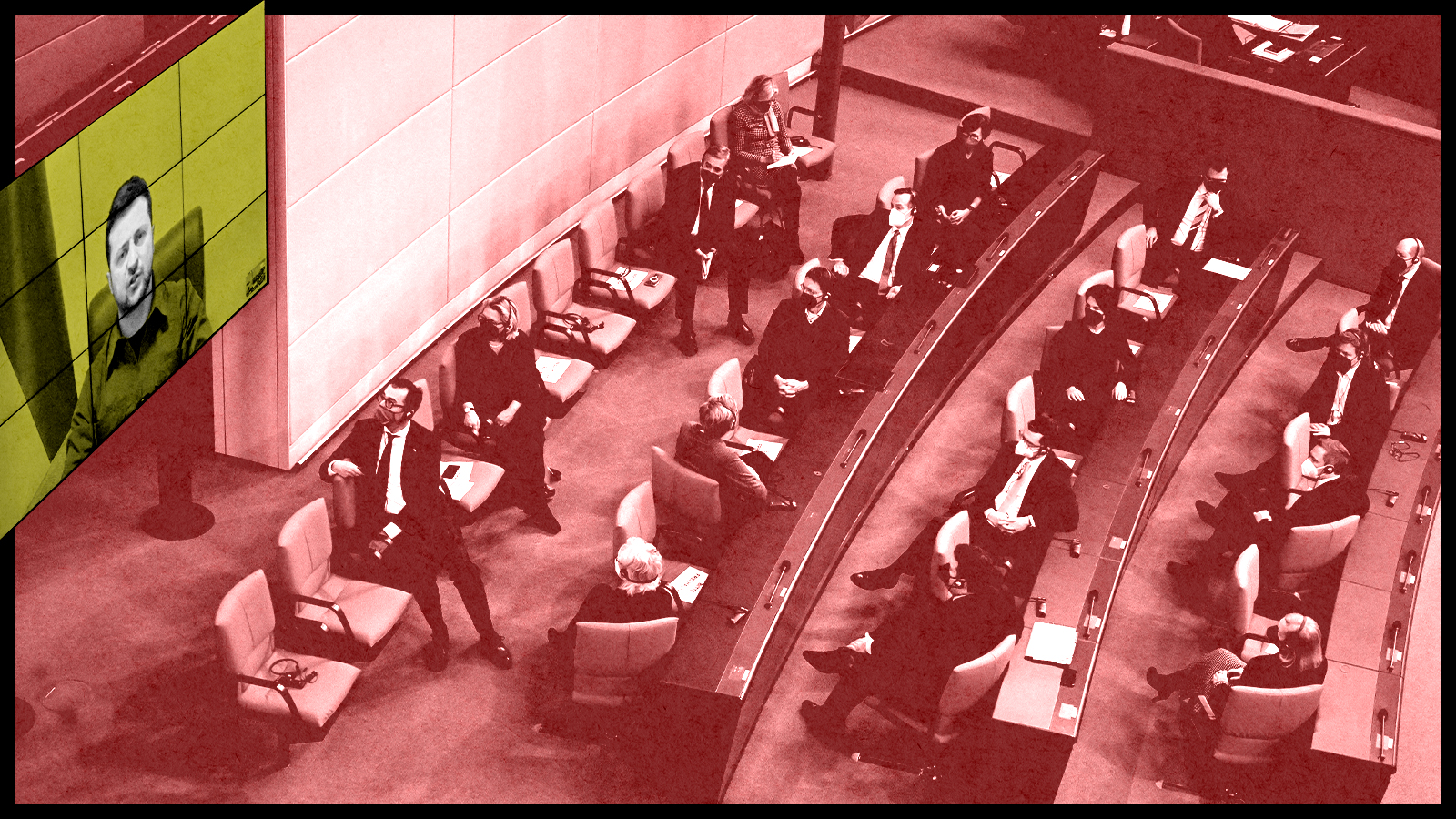Germany's parliament heard Zelensky. Then it voted on birthdays.


A free daily email with the biggest news stories of the day – and the best features from TheWeek.com
You are now subscribed
Your newsletter sign-up was successful
Continuing his virtual tour of Western capitals, Ukrainian President Volodymyr Zelensky addressed the German Parliament in Berlin Thursday morning. The Bundestag is not known as an exciting place under normal conditions, yet, if anything, the circumstances were even more dramatic than of Zelenky's appearance before Congress: Proceedings were briefly delayed, apparently because a rocket attack on Kyiv interrupted the video link.
The tone of Zelensky's speech was different from his U.S. remarks, too. While he called America to realize its ideals, Zelensky chided Germans for shirking their responsibilities and re-enacting a painful past. Appealing to German's recent history of communist rule and national division, Zelensky insisted Nord Stream 2, the controversial gas pipeline that connects Russian and Germany "is a weapon." "You always said, 'It's business, business, business,'" he continued, but Ukraine knew better. Now, Zelensky concluded, Ukrainian and other critics had been proved right: The pipeline was "cement for the wall" separating free Europe from the zone of Russian domination, and German opposition to European Union membership for Ukraine was yet "another brick."
As in Congress, Zelensky received sustained applause from his audience. But after brief parliamentary maneuvering, the Bundestag quickly returned to its scheduled agenda, which included official recognitions of birthdays and instructions on mask wearing. The contrast between the gravity of Zelensky's speech and the apparent indifference of the Bundestag is playing badly in the German press. It also suggests German politicians are far from ready for a permanent defense policy shift — let alone war.
The Week
Escape your echo chamber. Get the facts behind the news, plus analysis from multiple perspectives.

Sign up for The Week's Free Newsletters
From our morning news briefing to a weekly Good News Newsletter, get the best of The Week delivered directly to your inbox.
From our morning news briefing to a weekly Good News Newsletter, get the best of The Week delivered directly to your inbox.
Berlin's response has not been altogether indifferent, of course. In a surprise move earlier this week, the German government announced it would buy 35 F-35 jets from the United States, part of a broader effort to reach NATO's 2 percent target for military spending by member states, but also to better integrate with U.S. and other member forces. Yet there's a difference between promising money for planes that won't be delivered any time soon and intervening in a conflict that's already underway and unlikely to end in the near term even if the bombs stop falling for a time.
Despite the memories of the Berlin Wall which Zelensky tried to raise, geopolitical conditions don't change overnight. Germany's drift toward more active participation in the Western alliance is a development to be welcomed. But Germans still face looming dilemmas about their priorities in a world where civilizational blocs threaten to replace the undifferentiated global order of post-Cold War imagination. Germany won't be able to stay on its preferred agenda forever. Zelensky, the U.S., and Germany's European allies should keep up the pressure.
A free daily email with the biggest news stories of the day – and the best features from TheWeek.com
Samuel Goldman is a national correspondent at TheWeek.com. He is also an associate professor of political science at George Washington University, where he is executive director of the John L. Loeb, Jr. Institute for Religious Freedom and director of the Politics & Values Program. He received his Ph.D. from Harvard and was a postdoctoral fellow in Religion, Ethics, & Politics at Princeton University. His books include God's Country: Christian Zionism in America (University of Pennsylvania Press, 2018) and After Nationalism (University of Pennsylvania Press, 2021). In addition to academic research, Goldman's writing has appeared in The New York Times, The Wall Street Journal, and many other publications.
-
 Political cartoons for February 20
Political cartoons for February 20Cartoons Friday’s political cartoons include just the ice, winter games, and more
-
 Sepsis ‘breakthrough’: the world’s first targeted treatment?
Sepsis ‘breakthrough’: the world’s first targeted treatment?The Explainer New drug could reverse effects of sepsis, rather than trying to treat infection with antibiotics
-
 James Van Der Beek obituary: fresh-faced Dawson’s Creek star
James Van Der Beek obituary: fresh-faced Dawson’s Creek starIn The Spotlight Van Der Beek fronted one of the most successful teen dramas of the 90s – but his Dawson fame proved a double-edged sword
-
 ‘The forces he united still shape the Democratic Party’
‘The forces he united still shape the Democratic Party’Instant Opinion Opinion, comment and editorials of the day
-
 Big-time money squabbles: the conflict over California’s proposed billionaire tax
Big-time money squabbles: the conflict over California’s proposed billionaire taxTalking Points Californians worth more than $1.1 billion would pay a one-time 5% tax
-
 Did Alex Pretti’s killing open a GOP rift on guns?
Did Alex Pretti’s killing open a GOP rift on guns?Talking Points Second Amendment groups push back on the White House narrative
-
 Washington grapples with ICE’s growing footprint — and future
Washington grapples with ICE’s growing footprint — and futureTALKING POINTS The deadly provocations of federal officers in Minnesota have put ICE back in the national spotlight
-
 Trump’s Greenland ambitions push NATO to the edge
Trump’s Greenland ambitions push NATO to the edgeTalking Points The military alliance is facing its worst-ever crisis
-
 Why is Trump threatening defense firms?
Why is Trump threatening defense firms?Talking Points CEO pay and stock buybacks will be restricted
-
 The billionaires’ wealth tax: a catastrophe for California?
The billionaires’ wealth tax: a catastrophe for California?Talking Point Peter Thiel and Larry Page preparing to change state residency
-
 Trump considers giving Ukraine a security guarantee
Trump considers giving Ukraine a security guaranteeTalking Points Zelenskyy says it is a requirement for peace. Will Putin go along?
